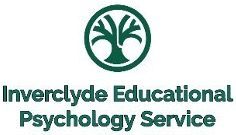We take a strengths-based approach to our work with children, young people and their families. We focus on working with staff, parents and carers to achieve the best outcomes for children and young people, particularly Inverclyde’s most vulnerable pupils.
- We use psychology to inform assessment and intervention with individual children and young people.
- We adopt the principles of Additional Support for Learning and GIRFEC in all our work.
- We work with partners across agencies to support Inverclyde’s children and young people who are placed outwith the local authority including those in day and residential placements.
- We share and promote ‘what works’ to both inform policy and develop practice in our educational establishments. Examples of some of the policies: – Promoting Positive Relationships, Learning, Teaching and Assessment Policy, Anti-Bullying and Bereavement, Change and Loss. The service takes a lead role on many of these policy areas for the local authority.
- We raise awareness of the crucial role of relationships, nurture and communication in children’s lives.
- We train others in the use of the most up to date evidence base relating to the pedagogy of learning, teaching and inclusion. By using research in cognitive psychology we can help education staff to prioritise the use of teaching strategies that can have the biggest impact on learning.
- We emphasise the importance of thinking about the needs of the whole child and seeking solutions which build on and recognise the strengths and assets of individual children and their families.
- We support effective transitions (early years into primary, primary to secondary, secondary to post school) to ensure young people are eventually successful in employment, further education or training.
- We work to ensure that assessment and intervention links to effective planning for children and young people.
- We design and put into practice interventions which help both individuals and communities develop optimal health and wellbeing.
- We incorporate the United Nations Convention on the Rights of the Child in all our work.
- We promote and support the voice of the child in the decision making process.
- We prioritise our attendance at Team Around the Child meetings and Review Meetings for children and young people who are Looked After.
Adapted from ‘Educational Psychology in Scotland: helping others to achieve their potential’ The Association of Scottish Principal Educational Psychologists/The British Psychological Society.


